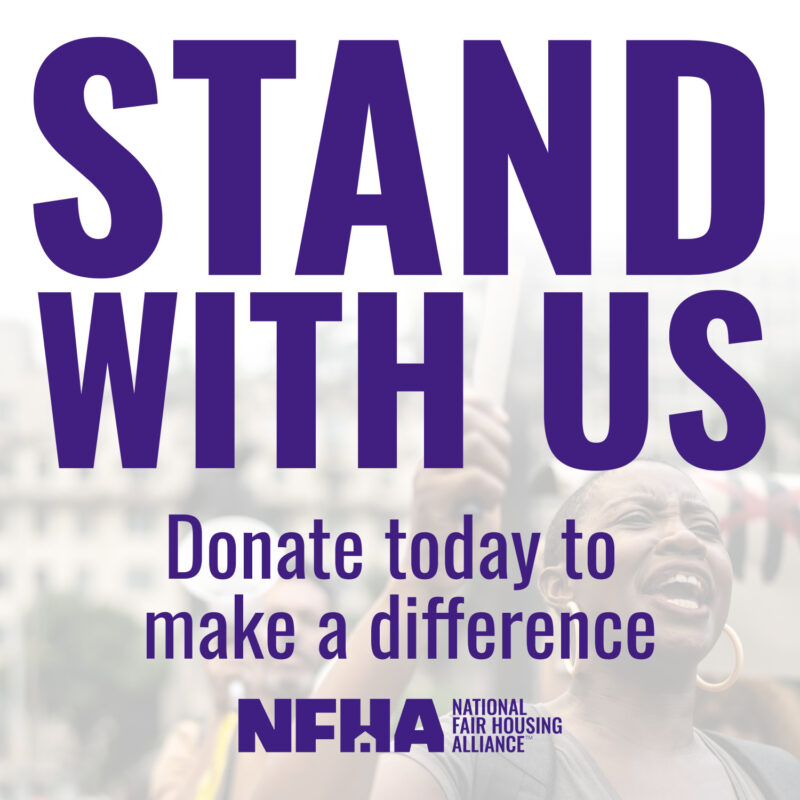NFHA Opposes HUD Proposal to Dismantle Fair Housing Act, Weaken Enforcement
For Immediate Release
January 07, 2020
Contact: Dale Van Ollefen | 202-823-3297 | dvanollefen@kivvit.com
As housing discrimination reaches record highs, Trump’s Department of Housing and Urban Development announces proposed rule to eliminate tool for communities to address discrimination and segregation
WASHINGTON – The National Fair Housing Alliance (NFHA) today warns of an alarming new Department of Housing and Urban Development (HUD) proposal that would permanently weaken enforcement of fair housing laws and allow communities to perpetuate housing discrimination and segregation. This latest move by HUD reflects what has become a sustained campaign by the Trump Administration to dismantle civil rights protections under the Fair Housing Act.
HUD’s proposal comes as the number of housing discrimination complaints reached a record high last year, as noted in NFHA’s 2019 Fair Housing Trends Report, and a comprehensive undercover Newsday investigation revealed rampant discrimination by local real estate agents. In response, NFHA published solutions to help stop real estate sales discrimination, but this new proposal from HUD would obstruct those and other efforts to advance fair housing.
The proposed rule would gut an important housing discrimination protection – the Affirmatively Furthering Fair Housing (AFFH) mandate – which is designed to correct discriminatory housing practices as well as the lasting impacts of government and privately sponsored residential segregation. Under the AFFH mandate, jurisdictions and Public Housing Authorities (PHAs) that receive federal funding must analyze patterns of segregation and discriminatory housing practices for families with children, people of color, people with disabilities and members of other protected classes. They are also required to take actions to tackle barriers to fair housing.
“What HUD has released is not a rule to affirmatively further fair housing. It significantly weakens fair housing compliance, entrenches segregated housing patterns, and continues the status quo in which some communities are strengthened by taxpayer-supported programs and amenities while other neighborhoods are starved and deprived of opportunities. At a time when housing discrimination has reached record highs, we need stronger enforcement of the Fair Housing Act instead of these continuous attacks by the Trump administration. Weakening the AFFH mandate gives cities and PHAs a free pass on discrimination,” said Lisa Rice, president and CEO of NFHA. “Segregation did not happen on its own; it was orchestrated by jurisdictions, government, PHAs, and private actors. Our nation has expended an incredible amount of resources creating the disparities that plague our communities. This proposed rule is the antithesis of what we need, which are resources, commitment, resolve, and a strong rule to promote fair housing. HUD should abandon this misguided effort and reinstitute the AFFH rule it adopted in 2015.”
NFHA cautioned that HUD’s newly proposed rule is worse than the previous Analysis of Impediments to Fair Housing (AI) system that the GAO found to be ineffective and not useful at all in reducing housing discrimination. The proposed rule does not correct the deficiencies the GAO found in its analysis nor does it incorporate the recommendations the agency provided.
The obligation to “affirmatively further fair housing” has applied to HUD, the jurisdictions it funds, PHAs, and other recipients of federal funds for housing purposes since the Fair Housing Act was passed in 1968. But it was not until July 2015 — 47 years later — that HUD promulgated the first federal regulation, known as the AFFH Rule, to effectively guide the compliance efforts of jurisdictions and enforce the AFFH mandate. The 2015 AFFH rule provided clear standards as well as assessment and mapping tools to help jurisdictions analyze their unique housing markets and the systemic barriers their constituents faced in finding housing free from discrimination. Jurisdictions have long asked HUD to develop a more directed process to help them comply with the law and develop meaningful and effective fair housing plans.
This proposed rule would eliminate the suspended 2015 AFFH regulation entirely, replacing it with a new rule that does not address segregation or provide clear standards or a format to help jurisdictions and PHAs identify and cure housing discrimination. The new proposed rule also conflates fair housing and affordable housing. It presumes that 1) eliminating various regulatory controls will expand the supply of affordable housing; and 2) expanding the supply of affordable housing will solve fair housing problems. Neither presumption is true. In fact, one of the nation’s largest, taxpayer-supported affordable housing programs, the FHA program, was implemented for decades in a discriminatory fashion that created and perpetuated segregation and helped intensify the racial wealth gap.
This move from HUD is the latest in a series of attacks from the Trump administration on civil rights protections. In 2019, HUD proposed to eliminate the disparate impact standard under the Fair Housing Act — a tool that has been used to protect civil rights for over 50 years. NFHA and a coalition of civil rights advocacy groups came together then to defend the disparate impact rule. The groups have vowed to beat back this latest effort by the administration to dismantle fair housing.
ABOUT THE NATIONAL FAIR HOUSING ALLIANCE
Founded in 1988 and headquartered in Washington, D.C., the National Fair Housing Alliance is the only national organization dedicated solely to ending all forms of housing discrimination. NFHA is the voice of fair housing and works to eliminate housing discrimination and to ensure equal housing opportunity for all people through leadership, education, outreach, membership services, public policy initiatives, community development, advocacy, and enforcement. NFHA is a consortium of more than 220 private, non-profit fair housing organizations, state and local civil rights agencies, and individuals from throughout the United States.
